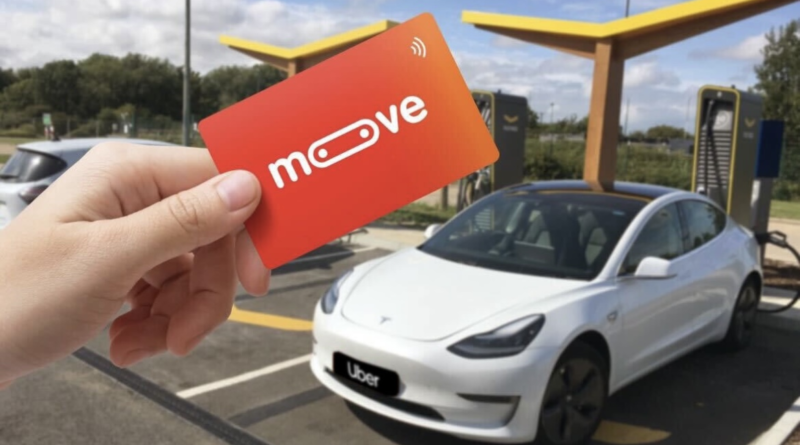Uber leads $100M investment in African mobility fintech Moove as valuation hits $750M
Moove, an African mobility fintech that offers vehicle financing to ride-hailing and delivery app drivers, has raised $100 million in a funding round as it plots expansion into new markets.
Moove did not say who is leading the round, but sources close to the deal confirmed to TechCrunch that Uber led the Series B round, making it the company’s first investment in the African continent. Update: After we published this article, Moove confirmed Uber’s investment in a LinkedIn post.
The round also includes sovereign wealth fund Mubadala and several other investors, pushing Moove’s post-money valuation to $750 million. This is up from the $550 million secured last August in a Mubadala-led equity and debt round. The news confirms a Bloomberg report from last month. Dubai-based The Latest Ventures, AfricInvest, Palm Drive Capital, Triatlum Advisors, and Future Africa also participated in the funding round.
The company has raised $250 million in equity (and $210 million in debt) to date.
The funding is critical for Moove as it prepares to push into new markets. The company operates in 13 cities across six markets, including Nigeria, South Africa, Ghana, the U.K., India and the UAE. Moove says it plans to use the new capital to expand its revenue-based vehicle financing platform to 16 markets by the end of 2025.
Moove takes a two-pronged approach to vehicle financing. The four-year-old mobility fintech buys fleets of vehicles, which it then sells to drivers through the platform. Its software offers financing to drivers through a credit-scoring system, enabling drivers to buy new vehicles for ride-hailing, logistics and deliveries. The vehicles provided to Moove customers vary from traditional options like Toyotas and Suzukis to electric vehicles (EVs) such as Teslas.
A percentage of the drivers’ weekly income is deducted and put toward vehicle payments.
Why Uber funded Moove
Uber operates in numerous cities across eight African countries: South Africa, Nigeria, Ghana, Egypt, Kenya, Tanzania, Uganda, and Ivory Coast. Its services are primarily available in major urban centers, where there is a considerable demand for ride-hailing services. In 2022, Uber completed 1 billion rides across these markets.
Nevertheless, the company has encountered challenges with regulatory bodies in some of these markets. These disputes have involved issues such as commissions, licensing, and taxation. Additionally, Uber has faced competition from rivals like Bolt and inDriver in these regions. That’s where Moove comes in.
Uber’s decision to back Moove, marking its first investment in an Africa-founded startup, suggests a concerted effort to ensure a steady supply of drivers for its ride-hailing platform (Uber is Moove’s largest car financing and vehicle supply partner; Moove also has partnerships with other gig networks, including SWVL and Kobo). Delano regards the investment as a validation of Moove’s business model and emphasizes its role in strengthening the strategic relationship between both parties.
Also, Uber’s investment in Moove and other fleet management startups, such as India’s Everest Fleet, aligns with the company’s commitment to a fully zero-emission fleet by 2040. EVs have, in turn, become a big part of Moove’s business strategy since its expansion beyond Africa in 2021. The vehicle financing startup operates large EV fleets in the UAE and the U.K. Currently, it’s testing a product line in India, with plans to introduce more than 20,000 EVs on Uber.
In a statement, Moove said that a considerable portion of its expansion into new markets will focus on EVs, “which will lay the groundwork for a more sustainable and accessible mobility ecosystem for its customers worldwide.” However, customers in Africa may experience delays in participation.
Moove was initially optimistic about expanding its EV product line in Africa. In a 2021 interview, co-CEO Ladi Delano outlined a strategy: Moove would purchase new EV cars at a discount and sell them at lower prices in the region. Potential challenges such as poor road conditions and a lack of charging infrastructure needed for scaling across Africa could have tempered Moove’s initial plan. Consequently, the startup is considering an alternative approach: natural gas vehicles.
“We want to be at the forefront of electrification in the U.K. and UAE by putting more EVs on the road. But in countries like Nigeria, we hope to be at the forefront of the transition from ICE (internal combustion) engines to compressed natural gas (CNG) vehicles and then from CNG to EVs,” the co-chief executive said on a call with TechCrunch. “We’re doing a lot of work at the moment to prepare the Nigerian market for CNG transition, in the hope that will reduce the impact of the increasing fuel price on the bottom line of our customers.”
Driver challenges
Over the past year, Moove drivers in Nigeria have encountered various challenges, including significant fuel price hikes amid over 30% inflation. Also, exchange rate fluctuations have impacted the cost of vehicle repairs in a nation heavily reliant on imports. Though drivers join Moove to find a source of income, these macroeconomic conditions have placed significant strain on them, leading some to protest that the working arrangements with the vehicle financing platform (particularly regarding the weekly remittance to the platform) add more stress than relief.
Delano explained that Moove’s has tried to tailor its products to tackle these challenges while maintaining profitability. He highlighted several initiatives, such as the Moove Care programs, implemented over the past year to support drivers. These initiatives include reducing weekly remittances by 33%, offering fuel subsidy plans during price hikes, and introducing flexible payment options. For instance, customers now have the flexibility to extend their repayment period from 48 months to 50 to 60 months, ensuring that the overall cost remains affordable on a weekly basis, he said.
Nigeria, in addition to being an unprofitable market, is no longer Moove’s largest market by virtue of customers as disclosed by Delano during the call. When questioned about the possibility of Moove exiting Nigeria due to ongoing macroeconomic challenges impacting its profitability, Delano said such a move was improbable. He attributed this stance to the mission behind founding the company with co-founder Jide Odunsi: to offer access to vehicle financing and generate employment opportunities and income for drivers in the country and across Africa.
“When we started the business, Nigeria had positive unit economics, but because of many macroeconomic factors, those positive unit economics obviously changed,” the CEO remarked. “But we can see and believe in a clear roadmap back to positive unit economics in that market in the not-too-distant future, notwithstanding the support we’re providing to our customers and the shocks we’re experiencing daily.”
Moove’s growth strategy
Moove has used diversification—by geography and market categories—to fuel its expansion while reducing risk. Not only is Moove in a variety of countries, but the company is also marketing to ride-hailing, logistics, mass transit, and instant delivery platforms. And it appears to be turning to Uber competitors as well.
TechCrunch has gathered from multiple sources that Moove recently inked a deal with Bolt, a major competitor to Uber in emerging markets, to expand options in ride-hailing, its most important category. The specifics of this partnership and its implementation remain unclear, especially given Moove’s existing arrangement with Uber.
Delano refrained from commenting, but he did say that Moove has secured numerous partnerships with various marketplaces globally to provide customers with more options. However, operationalizing these partnerships requires time, he added.
This latest funding comes after a year of significant growth for Moove, which is also backed by New York-based Left Lane Capital and European VC Speedinvest. Last August, the mobility fintech had 15,000 customers who completed more than 22 million trips. Now, it facilitates more than 30 million trips for over 20,000 customers across its six markets.
Moove’s annual recurring revenue also increased from $90 million to $115 million during this period; the company says it’s on course to achieve profitability during the upcoming financial year.
Following the deal, Moove, driven by its partnership with Mubadala, has relocated its headquarters to the UAE. The UAE holds significance for Moove, as it introduced its fully integrated charging solution there and recorded the highest number of EV trips on the Uber platform in 2023. Delano revealed plans to intensify investments in the UAE and other markets across Africa, Europe, and Asia while expanding into Southeast Asia and Latin America in the coming months.
“We believe in the potential of the African market and our business within it, so we will continue to invest accordingly,” he said. “However, it’s crucial for these investments to be profitable. Additionally, we will continue to assess opportunities globally and expand into markets where we see a clear path to achieving profitability or positive unit economics.”




